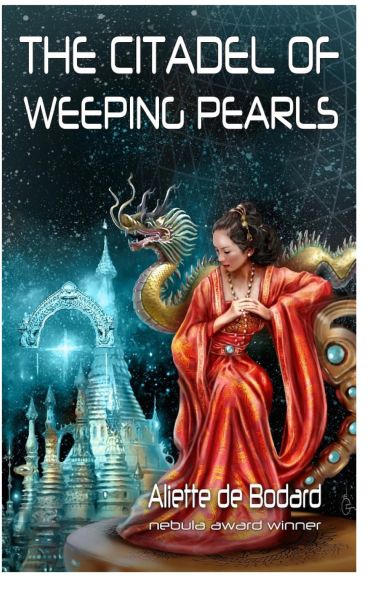Lady Bug, Lady Bug, Fly Away Home
The Citadel of Weeping Pearls
By Aliette de Bodard

16 Jan, 2018
0 comments
Aliette de Bodard’s 2015 space-opera The Citadel of Weeping Pearls is an instalment in her Universe of Xuya, an alternate history/future in which the West never dominated the world. The galaxy is ruled by Confucian powers.
Suu Nuoc is woken from a sound sleep by his alarmed shipmind, The Turtle’s Golden Claw. The artificial intelligence reports that Grand Master of Design Harmony Bach Cuc has seemingly vanished, in a manner the shipmind cannot comprehend. As far as The Turtle’s Golden Claw is concerned, it is up to Suu Nuoc — an Official of the First Order despite his low birth — to work out what happened to the missing scientist.
While Suu Nuoc wrestles with the puzzle of the vanished functionary, Suu Nuoc’s native Dai Viet empire has a more pressing issue: the looming war with the neighbouring Nam Federation. Not only is the Federation using a new, fast, La Hoa drive, the Federation has developed a means of subverting the Dai Viet’s mindships, which form the linchpin of their defensive strategy.
Prudence may dictate retreat, as humiliating as that would be. There is one slim hope. Years before, Bright Princess Ngoc Mihn’s steadfast intransigence provoked the Empress to order a strike on Ngoc Mihn’s spacestation, the Citadel of Weeping Pearls. When Dai Viet war craft arrived to destroy the Citadel, it was nowhere to be seen. How Ngoc Mihn’s people pulled off this vanishing act is a question for which no one has found an answer. Or had. Perhaps the missing Bach Cuc had solved the decades old mystery; perhaps that is why he disappeared … or was disappeared.
The Citadel was filled with wonders of science, marvels sufficiently miraculous that they alarmed the Princess’s mother and led to the quarrel that ended in the disappearance. Now, those very marvels are no longer seen as threats, but possible resources. There is an invasion fleet on its way towards Dai Viet. The Citadel and its secrets may be the empire’s only hope to avoid a humiliating defeat.
~oOo~
It’s all well and good to hope that an efficient bureaucrat will manage in the course of his investigation to find answers that can as a side effect provide the wonder weapons needed to reverse a military set back. It would be wise not to depend on it. We need only look at real history. Germany’s wonder weapons didn’t win their war; America’s Atomic Bomb arrived too late to end the war in Europe.
The Empress Mi Hiep and her advisor Lady Linh (who also features in On a Red Station, Drifting) may never have heard the saying “trust in god but tie your camel,” but they are familiar with the sentiment. The horse may never learn to sing, Rapunzel might never leave her tower, and the detective may not discover marvels that would save the empire. The only reasonable course of action is to assume that the last-minute save will never happen and to take the necessary, if distasteful, steps to face the worst.
Fans of adventure fiction may have been led to believe that there is always a way to escape the worst, no matter how improbable. They may expect that the million to one shot will pay off nine times in ten. At least the characters in this novella have better grasp of basic statistics.
Though I appreciated the prudent approach taken by the Empress and Lady Linh, I must admit that they would have been even more prudent had they not led their nation into such a one-sided confrontation with the Federation. But then there would have been no story.
The Citadel of Weeping Pearls is available here (Amazon) and here (Chapters-Indigo).
